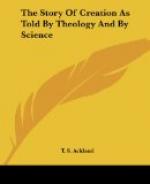As then we can have no direct knowledge of the moral and intellectual powers of animals, we can only judge of them from their actions, and other external signs. One great mark of difference has already been noticed. Man has, other animals have not, the power of laying up an external treasure of intellectual acquirements. Then there are certain arts which seem to be indispensable to man in his lowest state—no savage is so low that he is utterly destitute of them—no animal makes any pretence to them. Such are the designing, construction, and use of tools. Mr. Darwin asserts that in certain cases—very rare ones—apes have been known to use stones to break open nuts; but the mere use of a stone is a very different thing from the conception and deliberate formation of a tool, however rude. Then there is the kindling of fire, and the use of it for the purpose of cooking; and lastly, the preparation and the wearing of clothes. The tools or the clothes may be of the rudest kind, the tools may be formed from a flint, and the clothes from bark or skin, but in the preparation of each there are signs of intellectual power, of which we find no indications whatever in the lower animals.
Another important difference between man and all other animals lies in the fact, that whatever an animal does it does perfectly from the first, but it makes no improvements. A bird’s first nest is perfect. With man the case is the reverse, it is only by many trials, many failures, that he attains to skill in any operation, but then he goes forward. Arts improve from generation to generation. This seems to show that the faculties of man differ from those of animals in kind, and not in degree only.
The question also arises, if man has been produced from an anthropomorphous ape by a process of natural development, how is it that the same process has not gone on in other lines? The dog, the horse, and the elephant are at least equal in intelligence and sagacity to the highest known apes. Such a development from them cannot have proceeded through the line of the apes. If these different orders are at all connected it must be through some remote common ancestor. Why then has this development come to an abrupt termination in some cases and not in all? It may indeed be said that the dog and the horse are indebted for their intelligence to the inherited results of long intercourse with man, but this cannot be the case with the elephant, which is never known to breed in captivity. Nor is there any reason to believe that the present intelligence of the elephant is recently developed. Why then has it been arrested in its course?




